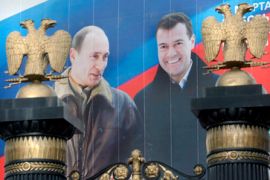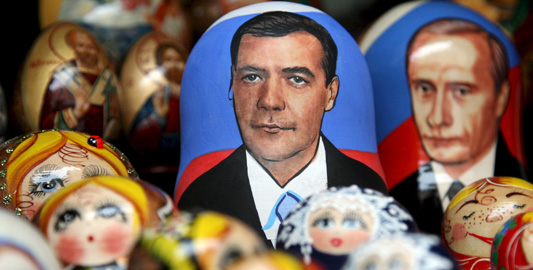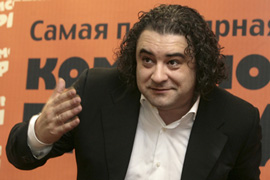Russia election: Who’s who
Al Jazeera looks at the four candidates battling for the presidency.

 |
| Matrioshka dolls of Russian presidential candidates are selling like hot cakes [EPA] |
Andrey Bogdanov
 |
| Bogdanov, head of the Democratic Party, is standing as an independent [AFP] |
Before he announced his candidacy, few people had even heard of the leader of the Democratic Party of Russia, who is standing as an independent.
He managed to collect the two million signatures required to stand despite his party only receiving 89,000 votes in last year’s parliamentary elections and several critics have suggested he was urged to run by the Kremlin to make sure the election went ahead.
At least two candidates are required in Russian election law to allow the vote go ahead.
Bogdanov has praised Vladimir Putin’s presidency and previously handled public relations for the United Russia party that overwhelmingly won last year’s parliamentary election and is supporting the candidacy of leading candidate, Dmitry Medvedev.
He has denied any link with the Kremlin.
Bogdanov has proposed reducing state involvement in the economy and greater involvement in European institutions but perhaps his most ambitious promise was saying that Russia would win the football world cup if he becomes president.
He is also the Grand Master of the Grand Lodge of Russia’s Freemasons.
Dmitry Medvedev
 |
| Medvedev, Putin’s blue-eyed boy, is the favourite to win the election [EPA] |
The chosen candidate of Vladimir Putin, the highly popular Russian president, is expected to win the presidency with a crushing victory over his rivals.
He has declined to debate his rivals during the campaign but has enjoyed an overwhelming amount of coverage on state television in the run-up to the election.
Supported by the United Russia party, which overwhelmingly dominates parliament, as well as Fair Russia, the Agrarian Party, and Civilian Power.
Medvedev has served as deputy prime minister since 2005 and was the head of the powerful state gas company Gazprom when he entered the race for the presidency.
Vladimir Zhirinovsky
|
|
| Zhirinovsky, in his fourth bid for election, has promised $4,000 to every Russian [AFP] |
The deputy speaker of parliament and the leader of the Liberal Democratic Party of Russia is making a fourth attempt at the presidency.
He ran in 1991, 1996 and 2000, his best result being third place with 7.81 per cent of the vote.
The nationalist politician has warned of the break up of the country after Kosovo’s independence and urged Russians in Estonia to form a separate state.
Previously Zhirinovsky has pledged “a man for every woman and a bottle of vodka for every man”, but this time out he has promised to give $4,000 to every Russian, raise the minimum pension and freeze food prices until later in the year.
However, he is perhaps most notable during this campaign for his scuffle with Bogdanov’s campaign manager during a televised debate.
Bogdanov has called for him to be dismissed as the parliament’s deputy speaker and be jailed for five years.
Gennady Zyuganov
 |
|
Zyuganov, the Communist leader, wants more |
The leader of the Communist Party of the Russian Federation fell just a few votes short of reaching the presidency in 1996. He was then defeated by Putin in 2000.
The life-long party functionary appeals to older Russians who remember the years of Soviet rule fondly but with the economy growing, it seems unlikely that people will back his calls to bring industry back under state control.
Zyuganov has also made pledges aimed at supporting Russia’s less well off, such as raising the minimum wage, and his speeches ring with Soviet ideology and references to his time in the army.
Several other candidates applied to run but were disqualified.
Mikhail Kasyanov
A former prime minister and current leader of the Popular Democratic Union, he registered as a candidate on December 14 but the Central Election Commission ruled that too many of his two million signatures on his application were forged.
He accused the Kremlin of being afraid of an “open battle” between Medvedev and himself and urged people not to take part in the vote.
Garry Kasparov
The former chess champion registered and leader of the United Civil Front wanted to run for the Other Russia movement that includes a number of small opposition parties.
However, he failed to put forward his candidacy by the deadline. He said government obstruction had prevented him from doing so.
Vladimir Bukovsky
The Soviet-era dissident received a new Russian passport at the Russian Embassy in London in August.
He arrived in Moscow in October to launch his campaign, but his bid was refused because he had not lived in Russia in the last 10 years – a legal requirement to run.
Oleg Shenin
The leader of the small, hardline Communist Party of the Soviet Union, Shenin was not registered due to mistakes in his documents.
